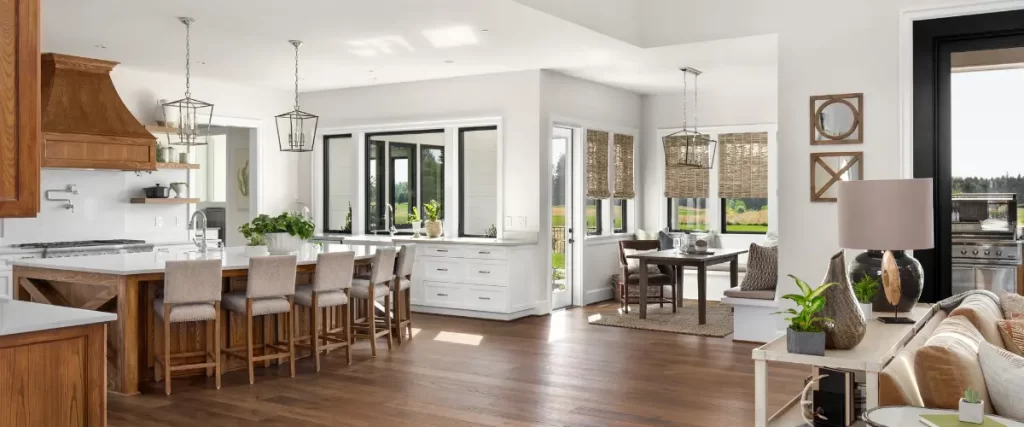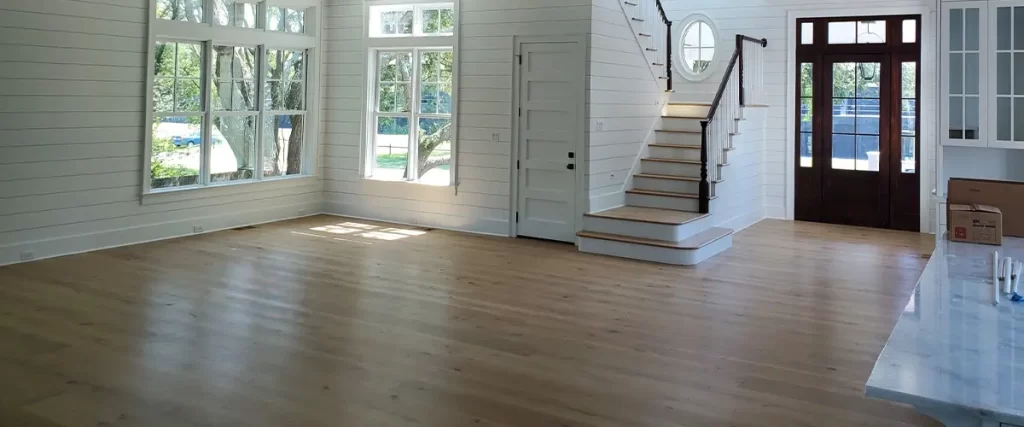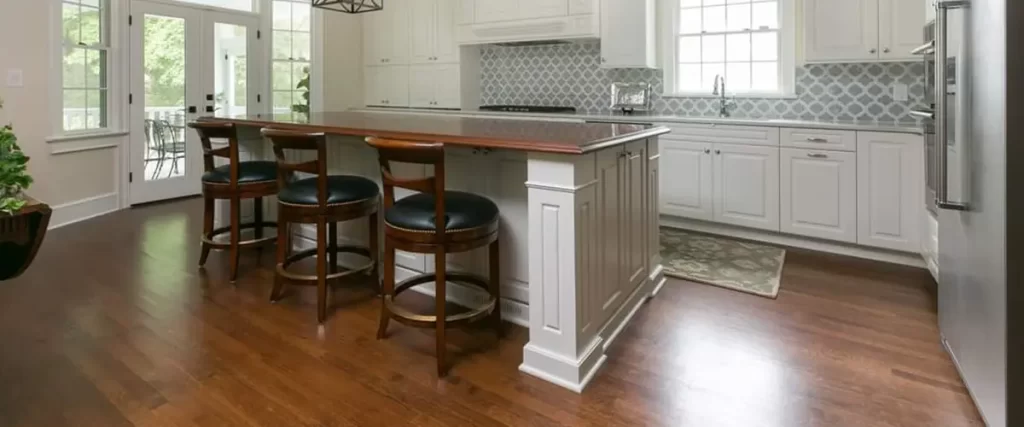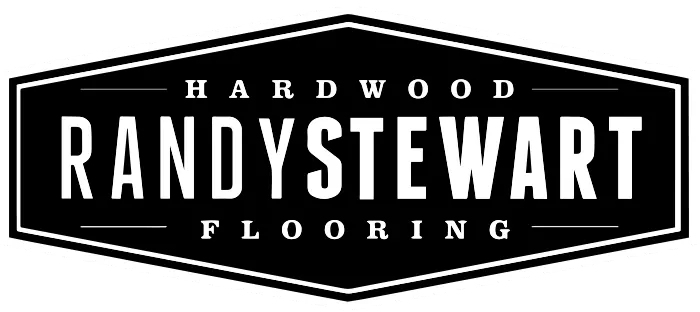If you’ve ever stepped barefoot onto your hardwood floors during a sticky Lowcountry summer, you know what we’re about to talk about. The humidity in Charleston isn’t just uncomfortable—it’s relentless. And while you’re managing frizzy hair or a fogged-up window, your hardwood floors are dealing with the effects, too.
For homeowners here in South Carolina, especially in places like Charleston where moisture is part of daily life, understanding how humidity impacts your hardwood floors isn’t just nice to know—it’s essential. The beautiful, rich flooring you installed (or inherited) could be at risk if you don’t take the right precautions.
Let’s walk through everything you need to know—from how Charleston’s humid subtropical climate affects your floors to how you can protect them year-round.

Charleston’s Climate: A Love-Hate Relationship with Moisture
Charleston is known for its historic charm, coastal beauty, and—you guessed it—high humidity. Our average relative humidity hovers between 70% to 90% throughout the year. And with temperatures regularly topping 90°F in summer, all that moisture in the air isn’t going anywhere fast.
You might be surprised to learn that hardwood flooring behaves almost like a living thing. It expands when it takes in moisture and contracts when it dries out. That means in Charleston’s humid summers, your floors can swell, cup, or buckle if not properly managed.
And in the rare dry spells during winter, they can shrink and leave gaps. It’s a push-pull relationship that’s tough on your floors—and your wallet—if ignored.
Why Hardwood Floors and Humidity Don’t Always Mix
Even the most premium hardwood flooring can suffer when humidity levels fluctuate drastically. Here’s what you might notice if your hardwood is under pressure from excess moisture:
Cupping: Edges of the wood planks rise higher than the center, causing a concave appearance.
Buckling: Severe warping that can lift the floorboards entirely from the subfloor.
Gapping: Boards separate as they shrink, creating visible spaces between planks.
Crowning: Opposite of cupping, where the center of the board rises above the edges.
And here’s the kicker—these changes aren’t always reversible. In some cases, you might be looking at repairs, refinishing, or full-blown replacements.
How to Protect Hardwood Floors from Charleston’s Humidity
Now for the good news: you can maintain beautiful hardwood floors even in a humid climate like ours. It just takes a little proactive care.
Install a Hygrometer
This small, affordable device monitors humidity levels inside your home. You want to aim for indoor humidity between 35% and 55%—the sweet spot for hardwood. Anything outside of that range can lead to floor damage.
Use Dehumidifiers (Especially in Summer)
If your home doesn’t have whole-house humidity control, a portable dehumidifier in high-risk areas—like basements, sunrooms, or areas near entryways—can work wonders.
Run Your AC Smartly
Air conditioning doesn’t just cool your home—it removes moisture from the air. Don’t turn your system off completely when you leave for vacation. A consistent indoor climate helps prevent flooring issues.
Seal and Finish Floors Properly
A professional-grade sealant can help your hardwood repel excess moisture. If you’re installing new floors or refinishing old ones, choose finishes designed for high-humidity environments.
Use Proper Underlayment
During installation, using a moisture barrier underlayment helps protect your floors from moisture rising from the subfloor. This is especially important in Charleston’s older homes or homes near marshes and waterfront areas.
Maintain Consistent Indoor Temperatures
Don’t let your home swing wildly between hot and cold. A stable indoor climate helps minimize expansion and contraction in wood.
Best Types of Hardwood for Humid Climates
Not all hardwoods are created equal. Some perform better than others in Charleston’s climate. If you’re considering installing or replacing your floors, here are some solid picks:
Engineered Hardwood: Built with layers that resist warping, making it more stable in fluctuating humidity. It looks identical to solid hardwood on the surface but performs better in wet conditions.
White Oak: Dense and less porous, making it naturally more moisture-resistant than red oak.
Bamboo (technically a grass, but often lumped in): More dimensionally stable and a sustainable choice for humid environments.
Teak: Known for its natural oils and high moisture resistance, though it comes with a premium price.

Common Charleston Flooring Mistakes to Avoid
Let’s talk about what not to do—because sometimes avoiding problems is just as important as fixing them.
Skipping acclimation time: Always let wood acclimate for at least 3–5 days before installation. This step is crucial in our humid region.
Using water-based cleaning solutions excessively: Moisture from mopping can seep between planks and cause damage over time. Use damp—not wet—mops.
Ignoring crawl space conditions: If your home has a crawl space, make sure it’s sealed and ventilated. Moisture from below can wreak havoc on your floors.
Top Hardwood Flooring Manufacturers Trusted for Humid Climates
When it comes to choosing quality hardwood flooring that can handle Charleston’s humidity, these brands stand out for durability and performance.
- Shaw Floors: Known for engineered hardwoods with moisture-resistant cores and eco-friendly finishes.
- Bruce Flooring: Offers a wide range of both solid and engineered products, designed for long-lasting wear and humidity control.
- Mohawk Industries: Provides cutting-edge engineered hardwood lines that hold up well in Southern climates.
- Mannington: Reputable for its engineered hardwood collections that use layered construction for enhanced stability.
- Mullican Flooring: American-made and committed to high-performance hardwoods that adapt well to humid conditions.
FAQ: Hardwood Floors and Humidity in Charleston
Can I install solid hardwood floors in Charleston, or should I stick to engineered?
You can install solid hardwood, but engineered is the safer choice if you’re worried about humidity-related warping.
How can I tell if my floors are being affected by moisture?
Watch for cupping, crowning, or wide gaps between planks. Also, a musty smell could signal trapped moisture.
Should I run a dehumidifier all year?
Not necessarily—but in the summer months or during hurricane season, it’s a wise investment.
What’s the best way to clean hardwood in a humid environment?
Use a microfiber mop and a pH-neutral wood floor cleaner. Avoid soaking the floor or using steam mops.
Can humidity damage be reversed?
Minor issues like cupping may resolve on their own if conditions normalize, but severe buckling often requires professional repair or replacement.

Final Thoughts: Love Your Floors, Protect Your Investment
Living in Charleston means embracing the beauty—and the challenges—of coastal living. Your hardwood floors are part of what makes your home feel warm, grounded, and full of character. But they need a little extra love in this climate.
By understanding how humidity affects wood, staying proactive with humidity control, and choosing the right materials, you can enjoy your floors for decades to come. Whether you’re restoring the charm of an old Charleston single or building new, smart floor care starts with knowledge.
Want help figuring out the best way to protect your floors? Contact us at (843) 900-4880, we’re happy to answer questions and offer guidance for your hardwood floor refinishing project. We’re local, and we know exactly what Charleston homes are up against.
